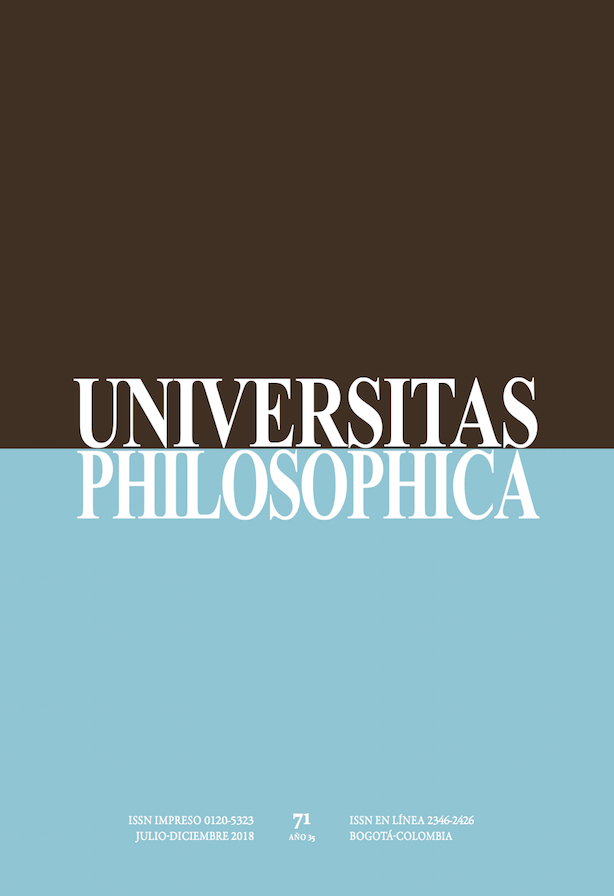Resumo
En este artículo, quiero proponer la tesis de que hay un hilo conductor en la filosofía de Tugendhat que vincula el análisis conceptual con su teoría moral y su teoría de la justicia. Mi intención es reconstruir algunos aspectos de su filosofía siguiendo su tesis de que es necesaria una aclaración conceptual para explicar qué es la justicia. Para tal fin, divido el siguiente texto en cuatro partes: en la primera, expongo qué entiende el autor por aclaración o análisis conceptual; en la segunda, explico algunos rasgos de su teoría moral, el contractualismo; y, en la tercera, presento su teoría de la justicia. Finalmente, doy cuenta de algunas conclusiones que enmarcan mi trabajo en el estudio de la discusión de la teoría de la justicia de Rawls y Tugendhat.
Bartolucci, C. (2008). La coscienza linguistica. Ernst Tugendhat tra ontologia e analisi del linguaggio. Perugia: Morlacchi Editore.
Bonet, J. V. (2013). La pregunta más humana de Ernst Tugendhat. València: Universitat de València.
Eriksen, A. (2009). Universalism and Obligation. Is Ernst Tugendhat’s Concept of anEmotionalObligationtoUniversalismDefensible?(Tesisdemaestría). Universidad de Oslo, Noruega. Recuperado de: https://www.duo.uio. no/handle/10852/ 24995?show=full.
Kant, I. (2010). [GMS]. Fundamentación de la metafísica de las costumbres. (Trad. Roberto Rodríguez Aramayo), Madrid: Alianza Editorial.
Limiñana, P. (2009a). La fundamentación de la moral y la ética del respeto igualitario en el pensamiento de Ernst Tugendhat. Revista Laguna, 24, 97-117.
Limiñana, P. (2009b). La filosofía moral de Ernst Tugendhat. Las Palmas de Gran Canaria: Universidad de las Palmas de Gran Canaria.
Limiñana, P. (2011). Paz, democracia, y derechos humanos. Una perspectiva individualista. Revista Dialética, 2(2), 9-22.
Mackie, J. L. (1975). Ethics: Inventing Right and Wrong. London: Penguin.
Martínez Ferro, H. (2004). El problema de la justificación de la moral en el pensamiento de Ernst Tugendhat (Tesis inédita de maestría). Universidad Nacional de Colombia, Bogotá, Colombia.
Martínez Ferro, H. (2007). Introducción a la filosofía moral de Ernst Tugendhat. Bogotá: Uniediciones.
Martínez Ferro, H. (2010). Los derechos económicos y sociales como mínimos de justicia distributiva. En: Memorias del Cuarto Congreso Nacional y Segundo Internacional de Derecho Constitucional (pp.195-205). Bogotá: Edinar. Rawls, J. (2006). Teoría de la justicia. (Trad. M. D. González). México/Madrid: Fondo de Cultura Económica.
Rorty, R. (1967). Introduction. En: R. Rorty (Ed.). The Linguistic Turn. Essays in Philosophical Method (pp. 1-39). Chicago: The University of Chicago Press.
Tugendhat, E. (1976). Vorlesungen zur Einführung in die sprachanalytische Philosophie. Frankfurt: Suhrkamp.
Tugendhat, E. (1982). Traditional and Analytical Philosophy. Lectures on the Philosophy of Language. Cambridge: Cambridge University Press.
Tugendhat, E. (1984). El método analítico. Cuadernos de Filosofía y Letras, VII (1-2), 49-60.
Tugendhat, E. (1988). Problemas de la ética. (Trad. J. Vigil). Barcelona: Editorial Crítica.
Tugendhat, E. (1994). Justice. En: H. Pauer-Studer. (Ed.). Norms, Values, and Society. Vienna Circle Institute Yearbook (vol. 2) (pp. 1-12). Dordrecht: Springer.
Tugendhat,E. (1997a).Propedéutica lógico-semántica. (Trad. G. Hoyos Vásquez). Barcelona: Anthropos.
Tugendhat, E. (1997b). Lecciones de ética. (Trad. L. R. Rabanaque). Barcelona: Gedisa.
Tugendhat, E. (1998). Ser, verdad, acción. Ensayos filosóficos. (Trad. R. H. Santos Ihlau). Barcelona: Gedisa.
Tugendhat, E. (1999). Diálogo en Leticia. (Trad. L. R. Rabanaque). Barcelona: Gedisa.
Tugendhat, E. (2002). Problemas. Barcelona: Gedisa.
Tugendhat, E. (2003). Introducción a la filosofía analítica. Barcelona: Gedisa. Wittgenstein, L. (1998). The Blue and Brown Books. Oxford: Blackwell. Wittgenstein, L. (1999). Investigaciones filosóficas. (Trad. A. García Suarez & U. Moulines). Madrid: Altaya.
Wolf, U. (1999). La filosofía y la cuestión de la vida buena. Madrid: Síntesis.
Zabala, S. (2005). ¿Qué significa pensar tras el giro lingüístico? La filosofía de Ernst Tugendhat. Revista Endoxa: Series filosóficas, 20, 619-637.
Esta revista científica se encuentra registrada bajo la licencia Creative Commons Reconocimiento 4.0 Internacional. Por lo tanto, esta obra se puede reproducir, distribuir y comunicar públicamente en formato digital, siempre que se reconozca el nombre de los autores y a la Pontificia Universidad Javeriana. Se permite citar, adaptar, transformar, autoarchivar, republicar y crear a partir del material, para cualquier finalidad (incluso comercial), siempre que se reconozca adecuadamente la autoría, se proporcione un enlace a la obra original y se indique si se han realizado cambios. La Pontificia Universidad Javeriana no retiene los derechos sobre las obras publicadas y los contenidos son responsabilidad exclusiva de los autores, quienes conservan sus derechos morales, intelectuales, de privacidad y publicidad.
El aval sobre la intervención de la obra (revisión, corrección de estilo, traducción, diagramación) y su posterior divulgación se otorga mediante una licencia de uso y no a través de una cesión de derechos, lo que representa que la revista y la Pontificia Universidad Javeriana se eximen de cualquier responsabilidad que se pueda derivar de una mala práctica ética por parte de los autores. En consecuencia de la protección brindada por la licencia de uso, la revista no se encuentra en la obligación de publicar retractaciones o modificar la información ya publicada, a no ser que la errata surja del proceso de gestión editorial. La publicación de contenidos en esta revista no representa regalías para los contribuyentes.


